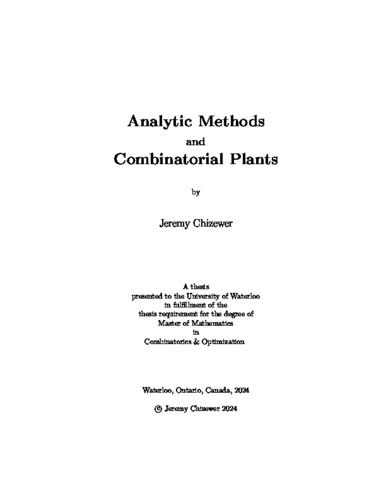| dc.description.abstract | Combinatorial structures have broad applications in computer science, from error-correcting codes to matrix multiplication. Many analytic tools have been developed for studying these structures. In this thesis, we examine three applications of these tools to problems in combinatorics. By coincidence, each problem involves a combinatorial structure named for a plant--AVL trees, cactus graphs, and sunflowers--which we refer to collectively as combinatorial plants.
In our first result, we use a novel decomposition to create a succinct encoding for tree classes satisfying certain properties, extending results of Munro, Nicholson, Benkner, and Wild. This has applications to the study of data structures in computer science, and our encoding supports a wide range of operations in constant time.
To analyze our encoding, we derive asymptotics for the information-theoretic lower bound on the number of bits needed to store these trees. Our method characterizes the exponential growth for the counting sequence of combinatorial classes whose generating functions satisfy certain functional equations, and may be of independent interest. Our analysis applies to AVL trees (a commonly studied self-balancing binary search tree in computer science) as a special case, and we show that about $0.938$ bits per node are necessary and sufficient to encode AVL trees.
Next, we study the hat guessing game on graphs. In this game, a player is placed on each vertex $v$ of a graph $G$ and assigned a colored hat from $h(v)$ possible colors. Each player makes a deterministic guess on their hat color based on the colors assigned to the players on neighboring vertices, and the players win if at least one player correctly guesses his assigned color. If there exists a strategy that ensures at least one player guesses correctly for every possible assignment of colors, the game defined by $\langle G,h\rangle$ is called winning. The hat guessing number of $G$ is the largest integer $q$ so that if $h(v)=q$ for all $v\in G$ then $\langle G,h\rangle$ is winning. We determine whether $\langle G,h\rangle $ is winning for any $h$ whenever $G$ is a cycle, resolving a conjecture of Kokhas and Latyshev in the affirmative and extending it. We then use this result to determine the hat guessing number of every cactus graph, in which every pair of cycles shares at most one vertex.
Finally, we study the sunflower problem. A sunflower with $r$ petals is a collection of $r$ sets over a ground set $X$ such that every element in $X$ is in no set, every set, or exactly one set. Erd\H{o}s and Rado~\cite{er} showed that a family of sets of size $n$ contains a sunflower if there are more than $n!(r-1)^n$ sets in the family. Alweiss et al.~\cite{alwz}, and subsequently Rao~\cite{rao} and Bell et al.~\cite{bcw}, improved this bound to $(O(r \log(n))^n$. We study the case where the pairwise intersections of the set family are restricted. In particular, we improve the best-known bound for set families when the size of the pairwise intersections of any two sets is in a set $L$. We also present a new bound for the special case when the set $L$ is the nonnegative integers less than or equal to $d$, using techniques of Alweiss et al.~\cite{alwz}. | en |

